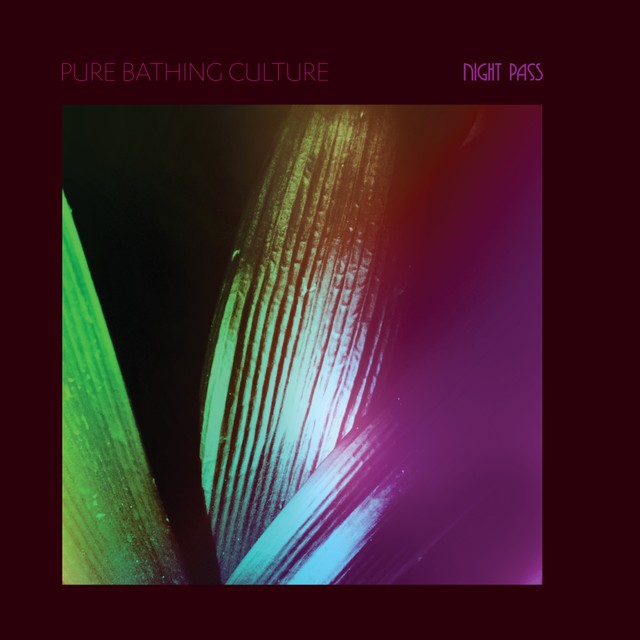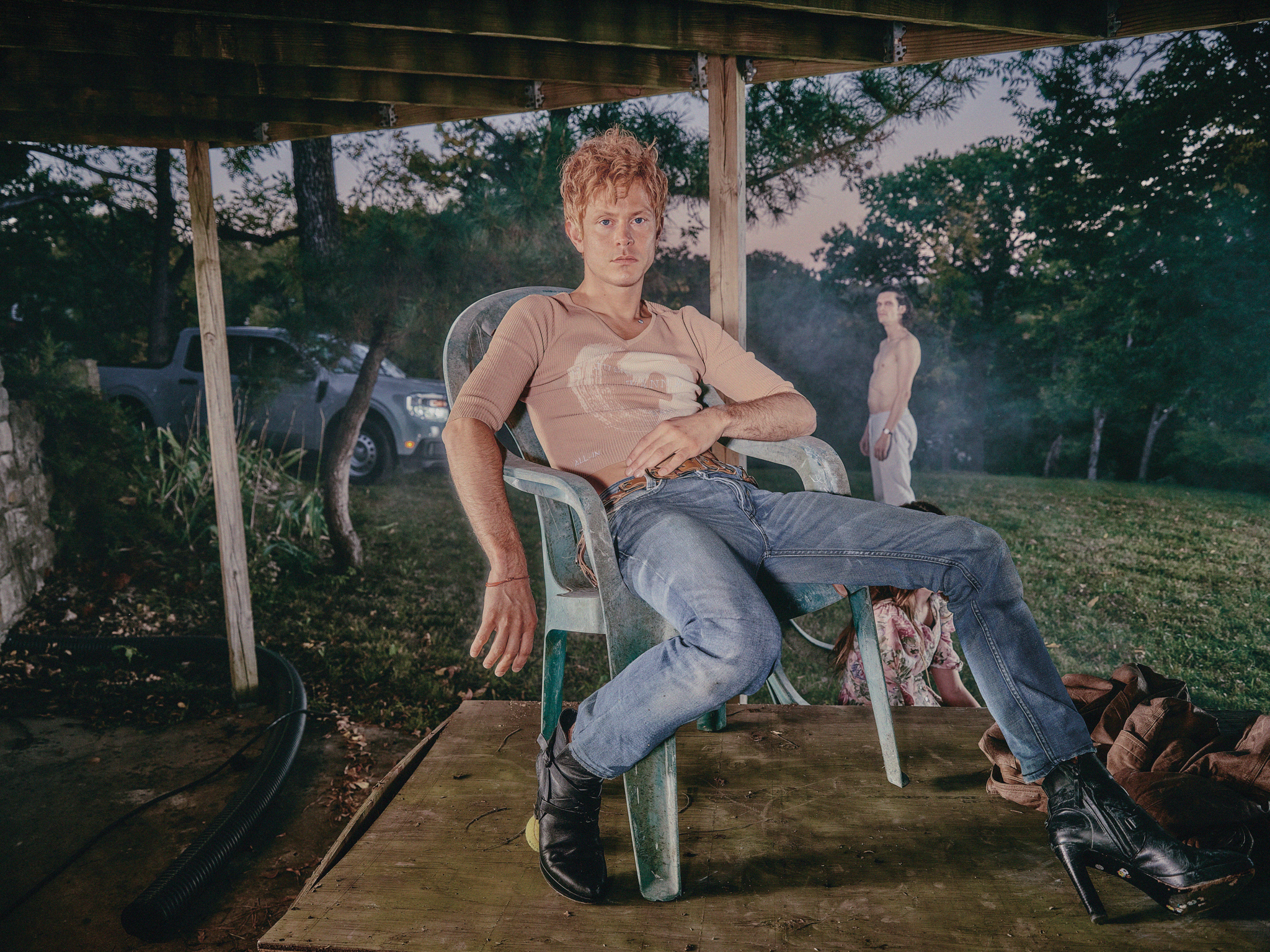In the first half of the decade, the Portland duo Pure Bathing Culture made their name with a mixture of dream-pop, soft rock, and folk leanings -- and became a Stereogum Band To Watch in the process. Across their first two albums, 2013's Moon Tides and 2015's Pray For Rain, the couple of Daniel Hindman and Sarah Versprille proved themselves adept at both elusive, watercolor reflections and strange-yet-infectious hooks, exemplified in highlights like "Pendulum" or Pray For Rain's title track.
Then, there was a long stretch before they returned in earnest. Pure Bathing Culture were still around, touring Pray For Rain and embarking on side projects, like a full-album cover of the Blue Nile's cult classic 1989 album Hats. But it took until 2019 for a new collection of Pure Bathing Culture originals to make it out in the world. That album, Night Pass, is finally being released today.
The ensuing years were difficult ones for Hindman and Versprille. Amidst writing and recording Night Pass, Pure Bathing Culture were dropped from their label and lost their team. They had to rebuild, find a new home. It kept Night Pass from being unveiled sooner.
It's impossible to hear the album outside of that context, to some extent. Writing through those experiences, and through the struggles of many indie bands who don't fit into one of the major narratives or scenes of this decade, Pure Bathing Culture fought to reclaim their love of music, fought to be able to keep making it. As Hindman puts it, Night Pass incidentally plays as full of self-assuring anthems.
Part of that was also inherent in Pure Bathing Culture's aesthetic growth. Having partnered with John Congleton for Pray For Rain, the band had already started to sculpt a shinier, more direct version of their sound. This time around, they worked with Tucker Martine -- who also has credits with REM and My Morning Jacket -- for perhaps their glossiest and sharpest collection to date.
Across the album, you can hear Pure Bathing Culture continue to push their disparate influences into interesting places. It often results in some of their hookiest material, songs that emphasize the "pop" half of dream-pop or move fully into the soft rock territory for which the two have always had an affinity. Songs like "Devotion" and "All Night" sound like lost '80s jams, meant for a hazy club from another time -- an association partially conjured by the video for "All Night," which leans fully into the aesthetic.
But there is still plenty of enigmatic and mystical imagery throughout, and layers to the music -- Night Pass at first suggests the slick and nocturnal sounds of the album, but is also a mythological reference applied to the trials of getting to their third album in the first place. Speaking by phone from Portland, Hindman and Versprille dove into the meanings and recordings of each song, providing a guide to their new album and how it got here.
1. "Thin Growing Thing"
STEREOGUM: There was a several year gap after Pray For Rain, and it seems like those were somewhat tumultuous years for you two. When it came time to return, what was going through your heads about how that new album had to open, how it had to reintroduce Pure Bathing Culture?
DANIEL HINDMAN: With that track "Thin Growing Thing," it's really about passion and love. And not becoming vindictive or becoming angry and succumbing to how dark things get when you aren't where you need to be. It being the first track on the record, we wanted something that was like, "Look, we do this for love." "I wear a ring for each thin growing thing," that first lyric is someone being like, "I believe in the process, I believe in growth."
We weren't thinking we were going to write this anthemic record about perseverance. It happened to us, because it was reflecting what was happening in our lives, especially professionally. We had the bottom fall out of so many things that just felt beyond our control. We really did feel like we had fallen through the cracks in a changing industry.
The record's not really about that so much as our love for one another and for our art. We wanted to start the record with that, because there are other tracks that are maybe angrier or more fiery. But we wanted to start the record with something more peaceful, the concept of "Lift for love and live for something."
STEREOGUM: If there are some more frayed or pissed-off moments, this would actually seem like a resolution at the beginning of the album. Where did it arrive in the writing process?
SARAH VERSPRILLE: It was one of the last songs we wrote. It had started as a song Dan had made as part of an instrumental record he's working on. I loved it, I loved the music. We were kind of thinking we were wrapped on the writing, but we worked on it. The music had existed for a while, but I really think it was the last song we wound up writing for the record.
HINDMAN: Something that should be noted is that this record was primarily written in 2016, which is crazy. It was right after the bulk of the touring for Pray For Rain had stopped. In our minds -- we did write this album and were ready to record it at the end of 2016, and it just didn't work out that way.
STEREOGUM: I know you might not want to go into all the gory details of this stuff, but you had to find a new label and a new team in the interim here. Did you have Night Pass finished before that bottom fell out and you had to sit on these songs for a while? Or did all that kind of happen at the same time?
HINDMAN: Mostly before and then simultaneously. By the time there were final mixes on the record, the bottom had kind of fallen out on everything.
STEREOGUM: Then it took a while to get it out into the world. Do you already have the next one brewing since these have been sitting there for a while?
HINDMAN: Conceptually, yeah. We haven't started recording. We've done some recording projects since. We went down to Richard Swift's studio after he passed away and recorded some tracks, but we're not entirely sure what form those are going to take, whether they'll be an EP or part of a new record. We have conceptualized a new record and are eager to write it and get into it, because this record was done all of 2017. We're in a place now where we need to get back to touring, but we feel like we're supposed to start a new record.
2. "Devotion"
STEREOGUM: There seem to be some connecting themes across the album about having a partner and getting through things together. Introducing the album with the opening track is one thing, but the lead single is how most people will first hear a preview. Was this the obvious mission statement?
VERSPRILLE: I think a big theme for us was that this band and our music wouldn't exist if it wasn't the two of us making it together. "Devotion" is maybe a celebration of that feeling, that exists between us. And since we did want to keep going, even through all this turmoil and tumult, these themes did keep emerging.
We have to look to each other for support. We have to come together in order to make this thing. The only way we're going to be able to keep doing this is if we do it together. That's a big theme on the record, and "Devotion" is definitely celebrating that idea, being able to look to each other and to our art for support. The idea that we could keep going.
HINDMAN: It was a fun song, and people at radio were responding to it. Some of it being the lead single was admittedly influenced by the normal elements of releasing a song.
STEREOGUM: It's complicated to be in a couple and in a band together, even without taking the hits you did while working on Night Pass. Were there moments you two doubted it, in which you needed to rediscover that connection and, well, devotion to it?
HINDMAN: It's the fastest we've ever written a record. Whatever that did generate between the two of us, it did make us stronger. We wrote it pretty quickly over a period of about three months. It's certainly the first record we've ever written where all the songs feel connected to one central theme. Some type of process did occur between the two of us where it did distill down to us being closer as writers and artists than we've ever been before.
3. "Veil"
STEREOGUM: You mentioned you had some other projects over the years. You recorded a full-album cover of the Blue Nile's Hats. In "Veil" and a little bit in "Moonrise," I felt like I could hear some of that influence. I was wondering if those two projects informed each other at all, or if there were different touchstones.
HINDMAN: With the Blue Nile thing, that was recorded right in the middle of making Night Pass. Tucker was able to work on Night Pass in two blocks, it was made over two three-week periods. After the first half, we had two months where we didn't have anything to do. That's when we did the Blue Nile thing, all at home, which was something we always wanted to do and we knew that the Turntable Kitchen thing was an opportunity to do that.
VERSPRILLE: I think lyrically, thematically, they have more to do with something like Prince or maybe '90s R&B. "Moonrise" is maybe the angriest the song on the record, and "Veil" is maybe the saddest. When I think of Blue Nile, I think more so of melancholy reflection. Love songs. "Veil" and "Moonrise" are definitely reflecting more on the angry part of yourself.
4. "Black Starling"
HINDMAN: This is one of the last songs we were writing. We were trying to push ourselves. The density in the lyrics was something we hadn't done before.
VERSPRILLE: That one tested us pretty hard.
HINDMAN: It's about someone who's depleted but refuses to give up.
VERSPRILLE: It's the feeling that you just need to go crazy if you want to keep going.
HINDMAN: That one just clicks with me on all levels as far as PBC goes. It's got lyrics about candles, and birds, and pentacles. You got ghosts in there. I don't think we're ever really going to stop. I think we'll rewrite that song a million times. [Laughs]
5. "Ad Victoriam"
STEREOGUM: When we spoke to you ahead of Pray For Rain, you were talking about how you'd started incorporating live drums and other textures, partially within the context of pushing back against being written off, by some, as "just another dream-pop" act when Moon Tides came out.
With songs like "Ad Victoriam," I feel like there's a continuation of something that had started to happen on Pray For Rain. The pop sensibility seems like it's coming further and further into the forefront. "Devotion," "Ad Victoriam," "All Night" -- they feel like a very bright and punchy extension of some older PBC ideas.
HINDMAN: Absolutely. If the question is, "Is the goal to become more poppy," I don't know. That exists within us, and it's fun to play that music live. It's fun to write and have those feelings. I love soft rock and pop. I think we're always trying to figure out how much we can get away with as a band. We're always scheming, like how poppy we can make something, but also like, maybe an album of all ballads. But yes, those songs are very poppy.
VERSPRILLE: We had done so much touring. We did a big one opening for Death Cab For Cutie and CHVRCHES. We were playing in these huge tennis stadiums. We were kind of interested in writing music that could be translated live with more forward motion. I think we were experiencing motion in a live setting that we hadn't found before, and some of these songs come from a desire to create something that could really move a larger space.
STEREOGUM: To get some more bangers in the mix.
VERSPRILLE: Yeah, exactly. [Laughs]
HINDMAN: We're always listening to different things. Sarah mentioned Prince. We're also listening to things like the Pretenders, or Dire Straits. Early Patti Smith records. Things that are more straight, rocking kind of things. Obviously Fleetwood Mac is a huge influence. We love that shit.
6. "All Night"
STEREOGUM: It's funny you bring up Fleetwood Mac. It's something people have said about Pure Bathing Culture before, and this song really brings them to mind. But it's interesting to me that you also bring up Dire Straits. Daniel, I feel like your guitar work is very clean and upfront in a much more prominent way on this album. Especially here or in "Moonrise," it's really a focal point.
HINDMAN: It was intentional and it was just kind of happening. That's more how I play guitar with the band live. I'm so, so enamored with Mark Knopfler and Lindsey Buckingham, and in the past it was more people like Robin Guthrie or Johnny Marr. More rhythmic guitar gods, if you will. But trying to find a way to let those other influences -- like, Mark Knopfler, is really, really different than those. [Laughs]
STEREOGUM: I was going to say, those are almost polar opposites to be reconciling in your playing style.
HINDMAN: I wonder if they ever hung out. [Laughs] A lot of that stuff was recorded improvisationally. When we started to incorporate that into the record, it felt weird to have it over-produced. So a lot of those were recorded in one pass. We started calling it "hype guitar." [Laughs] A lot of it would be rolling the tape, improvising over the whole pass, then going back through phrase by phrase, subtracting 80 percent of it and the remaining bits stayed on the track.
7. "Moonrise"
STEREOGUM: Sarah, you mentioned this was one of the angrier tracks. Was that a place you found yourself writing from much before this album?
VERSPRILLE: I think another song we have that relates, but is very different in how it sounds, is "Pendulum." That was also coming from that place, a little bit of vindictiveness.
HINDMAN: It's about being upset.
VERSPRILLE: Yeah, it's about being upset, totally. [Laughs] In "Moonrise," she's angry but she's also standing up for herself. Like, "I'm mad but I'm to go really hard, I have what I need to keep going inside of myself," is the feeling of the character in that.
8. "Remember"
STEREOGUM: In this song, there's a line that goes "Remember Gemini in June" and there's a bunch of astrological references in the next track, "Joyous Lake." Throughout the album, there are various words or allusions from and to the natural world, cosmic ideas. This has often been woven into Pure Bathing Culture's music over the years, too. What do you think keeps bringing you back to those images for inspiration?
HINDMAN: Spirituality.
VERSPRILLE: Yeah, tools of self-reflection. I think astrology is interesting. It's not necessarily about subscribing to a specific belief or saying, you know, "I'm like this because I'm a Libra." It's not the surface level of that stuff, but I think astrology or the I Ching or Tarot -- any of these more New Age-y spirituality things -- became inspiring because they were tools you can use. You don't have to say, "I think I'm divining my future through this Tarot card." But if it gives you a path forward to think about something in a way you haven't thought about it before, that's where those things become valuable to me.
STEREOGUM: You two got into all that stuff together when you moved to Portland, which lines up with the beginning of Pure Bathing Culture as well.
VERSPRILLE: I met someone in town who read my birth chart. I just didn't know anyone in New York who was into it. Then that was kind of the gateway forward with all that stuff.
9. "Joyous Lake"
[videoembed size="full_width" alignment="center"][/videoembed]
STEREOGUM: This is your mutual favorite track on the album. Why is your connection to this one so strong?
HINDMAN: "Remember," "Black Starling," and "Joyous Lake" all fit into that category we were talking about earlier, very PBC. It's got all the things we can't seem to stop singing about. But with "Joyous Lake" ... Sarah had a bit of a poem that began with her, sort of --
VERSPRILLE: My maternal ancestors. Like my great-grandmother, my grandmother, my great aunt, my mom, then my name. I had a little mantra I was saying with their names. Dan wrote the music for this on piano actually.
HINDMAN: I don't do that much. We wanted to try a ballad. The title from the record came from the lyrics in this song, too. It's kind of a meditation on patience, not giving up, admitting you're in a really tough spot, or not where you want to be. It connected on a lot of levels for us.
STEREOGUM: I was curious why that phrase, why you picked out those lyrics. Were there other contenders, or did Night Pass make itself obvious?
HINDMAN: There were some other contenders, other lyrics from "Joyous Lake." But we wanted to name the record something direct and succinct. Our last two have these more evocative names. One of the things when we were done recording this one, we realized we just wanted to be honest and say something more simple.
VERSPRILLE: It's a reference to the hero's journey. The difficult path across the treacherous sea. It felt simple but also meaningful, in that sense.
10. "Violet A Voyager"
STEREOGUM: You two always knew this was going to be the closer.
HINDMAN: It felt like it was a peaceful way to end this more severe idea. Bookending it with "Thin Growing Thing" and "Violet A Voyager" -- "Violet A Voyager" is a very positive song, it's just about moving on.
VERSPRILLE: It's a reflection on transition. On being ready for whatever the next step is. The last lyrics are "Will always be/ Like light beneath/ Will always be/ Above the moonlight shade," the idea that there's hope on the horizon even if it feels really horrible to be in that transitional space.
The times where we feel the most uncomfortable are the times when we're really in those moments. A song like "Joyous Lake" is trying to be like, "I'm zen in that moment of discomfort," and "Violet A Voyager" is being like, "It's going to pass. There's more. Just keep going. Don't be afraid to keep going."






